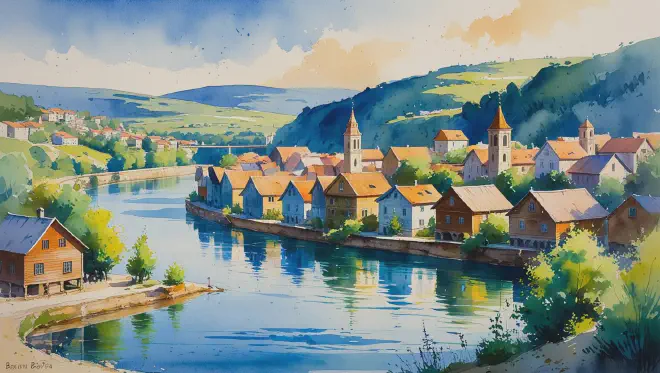Introduction
Bajina Bašta. When I first heard this name, its sound stirred something inexplicably nostalgic within me. This small town in western Serbia, nestled near the border with Bosnia and Herzegovina, is cradled by the beautiful flow of the Drina River and the deep forests of Mount Tara.
With a population of merely 5,000, this town is known to the world primarily for the tiny house floating on the Drina River - “Kućica na Drini” (The House on the Drina). Built in 1968 by local young men on a rock in the middle of the river, this small hut has become an iconic symbol of Serbia. Yet Bajina Bašta’s charm extends far beyond this famous landmark. As the gateway to Tara National Park, it’s a place where pristine nature and traditional Serbian culture remain deeply rooted.
The influence of the Serbian Orthodox Church runs deep here, with Cyrillic script dancing across street signs and storefronts. The people are simple and warm, welcoming visitors like family members. With such longing in my heart for this land, I decided to pull my small suitcase aboard a night bus from Belgrade, ready to let the journey rock me toward this distant dream.

Day 1: Arrival in Tranquil Embrace
The sound of the bus slowly coming to a stop woke me just after 6 AM. Bajina Bašta’s bus terminal was much smaller than I had imagined - more like a town square in the heart of the community than a proper station. As I stepped down, the cool mountain air brushed against my cheeks. The May morning carried a chill, and I pulled my light jacket closer around my shoulders.
My accommodation, “Pension Drina,” was just a five-minute walk away. As I made my way along the narrow cobblestone path, I caught the eye of an elderly woman watering flowers in her garden. “Dobro jutro” (Good morning), she called out with a smile that instantly melted away my travel fatigue.
The pension owner, Milan, was a gentle man in his sixties who welcomed me in fluent English. My room was on the second floor, with a small balcony overlooking the flow of the Drina River. After settling my luggage and catching my breath, I watched the morning sun dance in sparkles across the water’s surface.
I spent the morning exploring the town. The central area could be walked end to end in fifteen minutes, but every corner I turned revealed another picturesque scene. The Serbian Orthodox Church of Saints Peter and Paul stood beautiful with its white walls and blue roof, and inside its silent interior, local residents quietly offered their prayers.
For lunch, I visited the town’s only restaurant, “Café Drina.” The owner recommended ćevapi (small grilled meat sausages) and pljeskavica (a hamburger-like meat dish). The sweet and sour flavor of the ajvar (red pepper paste) that came alongside, and the simple taste of the freshly baked lepinja (flatbread), seeped into my tired body like medicine. I was offered a glass of local rakija (fruit brandy), and the strong plum-flavored spirit warmed my throat.
In the afternoon came the moment I had been waiting for - visiting the house on the Drina. A fifteen-minute walk along the riverside path from town brought me to where the small wooden house sits alone atop its rock. Having endured floods and harsh winters for over fifty years, this little hut was smaller than I had imagined, yet it radiated an undeniable presence.
I sat on a bench by the riverbank and gazed at the scene for a while. There were no other tourists besides myself, and all I could hear was the sound of flowing water and birdsong. Occasionally a local fisherman would pass by and wave casually. This tranquility, I realized, was the true charm of Bajina Bašta.
When I returned to the pension in the evening, Milan’s wife Marija had prepared homemade sarma (cabbage rolls) for dinner. Ground meat and rice wrapped in cabbage leaves, slowly simmered in tomato sauce - a true taste of home. In her broken English, she smiled and said, “Japan, very far, you come good.” Her kindness warmed my heart, and despite being in a foreign land far from home, I felt the comfort of returning to a family home.
Night falls early here, and by 9 PM the entire town was wrapped in silence. Standing on my balcony listening to the river’s sound, I reflected on the day’s events. Away from urban noise, in this place where time flows slowly, I could feel the fatigue that had accumulated deep in my heart beginning to dissolve, little by little.
Day 2: Tara’s Forest and the Breath of Tradition
Breakfast was a typical Serbian morning meal prepared by Marija: kajmak (a cream cheese-like fermented dairy product), med (honey), and fresh-baked bread. The rich sourness of the kajmak harmonized with the honey’s sweetness in my mouth, providing simple yet deep satisfaction. The coffee was strong, meant to be savored slowly from a small cup.
I had planned a day trip to Tara National Park. Milan introduced me to Jovan, a taxi driver friend, and we departed at 8 AM. After thirty minutes climbing mountain roads, we reached a viewpoint where I could see the Drina River’s meandering course below and the mountains of Bosnia and Herzegovina across the border.
“Here is the border,” Jovan said, pointing to where foreign landscapes indeed spread before us. Yet no border lines were visible among the mountains and rivers, and before nature’s majesty, human-drawn boundaries seemed trivial. In his imperfect English, he spoke about the complex history of this region. “War, very sad. But now peace, good,” he said, words that seemed to carry the feelings of all people from this land.
Entering Tara National Park, the air became even cleaner. Ancient spruce and fir trees, centuries old, stood in rows, while soft moss carpeted the ground beneath my feet. In the silence filled only with birdsong and the rustling of trees, I walked slowly along the nature trail. A squirrel peeked out from a tree branch, gazing at me curiously. In that moment, city life felt like a distant memory.
Lunch was at “Šuma,” a mountain lodge-style restaurant. Their specialty was grilled wild boar with kikrama (a potato dish). The boar meat had no gamey smell and was grilled with herbs, offering a wild, robust flavor. The kikrama was like rustic mashed potatoes, but rich with butter and sour cream - perfect nourishment for a body tired from mountain walking.
In the afternoon, I visited a village craft workshop. A 70-year-old man ran this small workshop alone, creating small items using traditional wood carving techniques. Serbian Orthodox crosses and small boxes with beautiful geometric patterns - each piece radiated the warmth of handmade craftsmanship. Though we couldn’t communicate in words, just watching his concentrated expression and hand movements allowed me to feel the weight of traditional techniques.
When I purchased a small cross, the old man smiled happily and said “Hvala” (thank you) while grasping my hands in both of his. His palms bore the hard calluses built up from years of handwork, and I could feel the weight of a lifetime within them.
Returning to Bajina Bašta in the evening, I encountered local families having picnics along the river. Families with children had spread blankets on the grass, gathering around homemade food. One family waved and invited me to join them. Through broken Serbian and English, mixed with gestures, we communicated while they shared their homemade sandwiches and house wine with me.
The children were full of curiosity, asking various questions about Japan. “Are there ninjas?” “Do you eat sushi every day?” - such adorable questions. As I answered them, I felt the warmth of human connections that transcend borders. The father, Zoran, said with a big smile, “Serbian people treasure family. You are family today too.”
That night, I sat on the pension’s terrace with Milan, sharing rakija and conversation. A former teacher, he told me in detail about the town’s history and culture. “Bajina Bašta is small town, but heart is big,” he said - words that left a lasting impression. Under the starry sky, listening to the river’s sound, I contemplated the true meaning of travel.
Day 3: Farewell and Memory’s Imprint
On my final morning, I made a point of rising early to visit the house on the Drina once more. At 6 AM, with morning mist still rising from the river’s surface, I stood alone in the silence, quietly facing this small house. Viewed from a different angle than yesterday, the morning sun made the house appear to glow golden.
This small house that had coexisted with nature for over fifty years. Though artificial, it had become part of the landscape, making me reflect on the harmony between humans and nature. I took several photographs, but knew that no camera could capture the serenity of this moment.
After breakfast, Marija packed a bag of prjanice (gingerbread cookies) she had specially made for me. “Eat in Japan, remember Serbia,” she said with such thoughtfulness that my chest grew warm. Milan also said, “Come back anytime. This is your second home,” and we exchanged a firm handshake.
Before departure, I spent my final time walking through town once more, saying goodbye to the people who had taken care of me. The grandmother who had been watering flowers waved “Doviđenja” (goodbye), the café owner presented me with a small Serbian flag pin, and the wood carving craftsman, though few in words, nodded deeply and gripped my hands.
The 12 PM bus would take me back to Belgrade. While waiting at the small bus terminal, Zoran from the family I’d met yesterday came running to see me off. “Safe travels,” he said, along with a drawing his children had made showing the flags of Japan and Serbia together.
As the bus began moving, the scenery of Bajina Bašta gradually grew smaller through the window. The Drina’s meandering course, Tara Mountain’s ridgeline, and the scattered houses throughout. Though my stay had been merely two nights and three days, this town had certainly taken root in my heart.
Watching the landscape pass by the window, I thought about the meaning of travel. Visiting new places, touching different cultures, connecting hearts with unknown people - all of these were precious experiences that enriched one’s very self. Especially the warmth shown by local people across language barriers renewed my faith in the fundamental goodness of humanity.
When I arrived in Belgrade, dusk was already beginning. As the noise of the big city returned to my ears, I realized how precious Bajina Bašta’s tranquility had been. Yet in my heart remained vivid memories: the sound of that river, the green of the mountains, and the smiles of the people.
Conclusion
This journey is a product of imagination. Yet as I continued writing, the sensation of walking Bajina Bašta’s cobblestones, the cold wind from the Drina River, the taste of Marija’s homemade cooking, Milan’s warm handshake, and each encounter with the people began to feel as real as if I had truly experienced them all.
Perhaps travel does not necessarily mean only physical movement. Opening one’s heart, exercising imagination, and letting thoughts wander to unknown worlds - this too might be a form of travel. The time spent researching Serbia as a country, Bajina Bašta as a small town, learning about its culture, history, and people’s way of life, certainly helped me grow.
If someday I truly have the opportunity to visit Serbia, I wonder if there will be moments when these fictional memories overlap with reality? Or will there be completely new discoveries, different from what I imagined? Either way, it would undoubtedly be a wonderful experience.
A journey that, though imaginary, feels as if it truly happened - perhaps this is proof of human imagination and the richness of the heart. Bajina Bašta, this small town, continues to breathe quietly within my heart even now.

